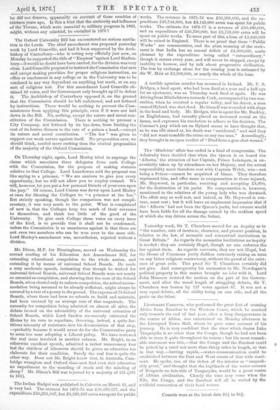The Oxford University Bill has encountered no serious mutila- tion
in the Lords. The chief amendment was proposed yesterday week by Lord Granville, and had it been supported by the Arch- bishop of Canterbury—who is voting very officially just now, on Monday he supported the title of "Empress "against Lord Shaftes- bury—it would no doubt have been carried, for the division was very -close. Lord Granville proposed to instruct the Commission that save and except making provision for proper religions instruction, no office or emolument in any college or in the University was to be rendered in any way dependent on anything but merit, or on any sort of religious test. For this amendment Lord Granville ob- tained 40 votes, and the Government only brought up 57 to defeat it. The Archbishop of Canterbury opposed it, on the ground that the Commission should be left unfettered, and not fettered by instructions. There' would be nothing to prevent the Com- missioners from applying this principle, even if it were not laid -down in the Bill. No, nothing, except the nature and moral con- stitution of the Commission. There is nothing to prevent a City Company, not fettered by its bye-laws, from limiting the -cost of its festive dinners to the rate of a guinea a head,—except its nature and moral constitution. "The law" was given to support our weak nature against itself. No propensities ever, we should think, needed more curbing than the clerical propensities -of the majority of the Oxford Commission.


































 Previous page
Previous page